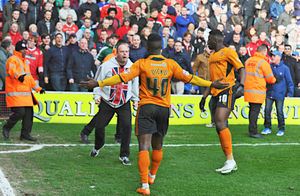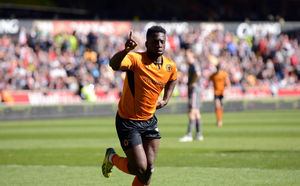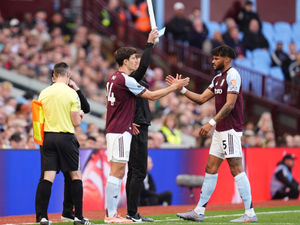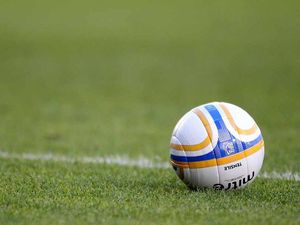Nouha Dicko: It was magic... I know!
It is a decade since Nouha Dicko joined Wolves permanently having previously been at the club on loan, an overall spell which included many of the typical ups and downs associated with life at Molineux. Here, he looks back, with Paul Berry.

Within minutes of Nouha Dicko scoring his first Wolves goal against Burnley, a group of seriously disgruntled members of the Molineux faithful invaded the pitch, smashed up the dugout and advertising boards and vented their collective spleens at the club’s Board.
By the time Dicko grabbed his last Wolves goal, away at a Hull team he would join shortly afterwards, Ruben Neves and Diogo Jota were the accompanying names on the scoresheet. Fellow Molineux royalty.
There, in a nutshell, is the perfect illustration of the rollercoaster ride enjoyed - or sometimes endured by Dicko - during his time at Wolves.
Triumph, disaster and very little in between.
Dicko came through the vitriol and anger directed at the club during his spell on loan. Then the pure, unadulterated joy of the record-breaking League One promotion. The promise and frustration of going so close to the Championship play-offs. And the pain of a desperately ill-timed long-term injury.
But through it all, the crowd loved him. His pace, power, passion and predatory instincts in front of goal made him a firm favourite. He was Wolves’ pocket rocket – and the fans loved him for it.
The feeling was mutual.
“It’s that West Midlands accent again,” he chuckles as he picks up the phone from his home in Greece, where he plays for OFI Crete in the Super League.
“It’s nice to hear it, and I still follow Wolves because Wolves will always be a big part of my life.
“Even just talking about them again brings back all the memories.
“I had some amazing times, and some difficult times, and when I left it felt like the break-up of a love story!
“But I will always enjoy those special days and be happy at what we achieved.”

Playing in England was always an ambition for Dicko, who was born in the suburbs of Paris of Malian descent, and first played for Strasbourg, located on the German border in the region of Alsace.
“English football has always been very popular amongst French fans and players, and when I was growing up, I remember watching a lot of Arsenal,” he explains.
“They had a lot of French players, especially that Invincibles season when they won the league and stayed unbeaten.
“I always wanted to discover England, and also Germany, and when Strasbourg went into financial difficulties I was released and was effectively a free agent.
“I had contacts with clubs in both countries, but in the end, Germany didn’t happen and I moved to England, with Wigan, instead.”
At the time Wigan occupied the Premier League, and, after making his debut in the Carling Cup, several loan spells followed as Dicko learned his trade.
Two spells with Blackpool included coming off the bench in the play-off final defeat against West Ham at Wembley – he would later do the same for Wigan in the Community Shield against Manchester United – while a short stay with Rotherham included plenty of goals including a brace in a memorable 3-3 draw against Wolves.

In between all that came that initial loan at Molineux, during a hugely volatile time as the club suffered their second successive relegation amid much pain and acrimony.
Dicko’s debut came as a substitute for the stricken Sylvan Ebanks-Blake in the 3-2 win at Birmingham, but his additional three appearances all ended in defeat which saw the team tumble into League One and manager Dean Saunders lose his job.
That first goal in the final home game against Burnley was merely a consolation which failed to calm the rage and fan fury which spilled over after the final whistle, and last day defeat at Brighton – where Wolves next pitch up in the Premier League on Monday night – sealed the deal.
“I have to be honest, when I first came to Wolves, I hadn’t realised how big the club were,” Dicko admits.
“As I said, there was a lot of interest in English football back in France but it was all about the Premier League and not so much the Football League.
“I know Wolves were struggling at the time, but I remember the two games I played at Molineux and scoring against Burnley and thinking, ‘wow – this club is big’!




